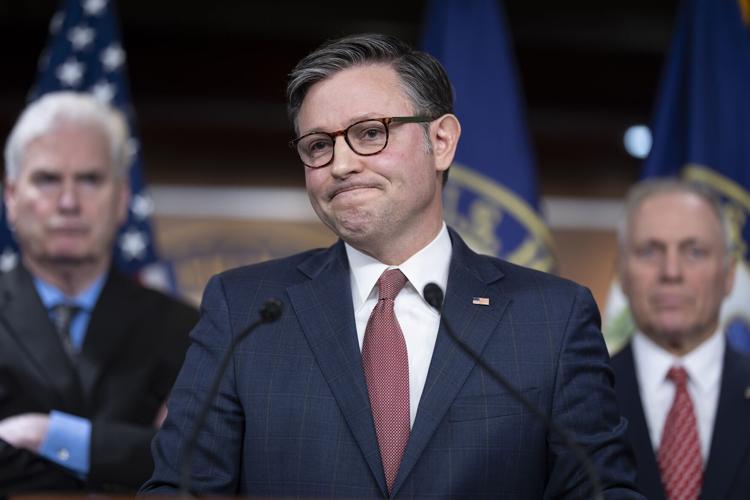WASHINGTON ÔÇö House Speaker Mike Johnson rebuffed pressure to act on the investigation into Jeffrey Epstein, instead sending members home early for a monthlong break from Washington after the week's legislative agenda was upended by Republican members clamoring for a vote.
Johnson, a Republican from Louisiana, said Tuesday morning he wants to give the White House "space" to release the Epstein information on its own, despite the bipartisan push for legislation that aims to force the release of more documents.
"There's no purpose for the Congress to push an administration to do something they're already doing," Johnson said at his weekly news conference, his last before lawmakers depart Washington on Wednesday for their traditional August recess.

House Speaker Mike Johnson, R-La., flanked by Majority Whip Tom Emmer, R-Minn., left, and Majority Leader Steve Scalise, R-La., speaks at a news conference Tuesday at the Capitol in Washington. 
The speaker's stance did little to alleviate the intra-party turmoil unfolding on Capitol Hill as many of President Donald Trump's supporters demand the administration meet its promises to publicly release a full accounting of the sex trafficking investigation into Epstein, who killed himself in his New York jail cell in 2019 while awaiting trial.
People are also reading…
Under pressure from right-wing online influencers, as well as voters back home, rank-and-file Republicans demanded that the House intervene in the matter.
"The public's not going to let this die, and rightfully so," said Rep. Ralph Norman, a South Carolina Republican.
Johnson's control under threat
The dynamic left Johnson with slipping control of his Republican conference and several crucial committees. Even before Johnson spoke Tuesday morning, a Republican-controlled subcommittee of the House Committee on Oversight advanced a resolution to subpoena Epstein's former girlfriend, Ghislaine Maxwell, for a deposition.
Johnson decided to end the House's legislative business early this week after he essentially lost control of the powerful House Rules Committee, which sends bills to the floor for debates and votes.

House Speaker Mike Johnson, R-La., talks to reporters Monday about calls to release documents related to Jeffrey Epstein at the Capitol in Washington. 
Late Monday evening, business on that panel ground to a halt when the Republicans on the committee abruptly recessed proceedings rather than risk more proposals from Democrats pushing them to release Epstein files.
Frustration in the House has been high since last week, when Republican leaders signaled possible support for a vote on the Epstein files as they raced to pass a $9 billion package of spending cuts. GOP leaders unveiled a resolution that has no legal weight but would urge the Justice Department to produce more documentation.
Trump, meanwhile, asked Attorney General Pam Bondi to seek the release of testimony from secret grand jury proceedings in the case, though that effort is unlikely to produce new revelations.
Separately, a senior official said Tuesday the Department of Justice wants to interview Maxwell, who was convicted of helping the financier sexually abuse underage girls and is now serving a lengthy prison sentence.
If Maxwell ÔÇťhas information about anyone who has committed crimes against victims, the FBI and the DOJ will hear what she has to say,ÔÇŁ Deputy Attorney General Todd Blanche said in a post on social media.┬á
A lawyer for Maxwell confirmed there were discussions with the government.

President Donald Trump speaks Tuesday in the Oval Office of the White House in Washington. 
A political wedge
Even with the monthlong break, the pressure on Johnson is unlikely to end.
Rep. Thomas Massie, a Republican whose contrarian stances are often a thorn in the side of leadership, is gathering support for a legislative maneuver to force the bipartisan bill to a House vote, even without leadership's consent.
"Now, there are a lot of people here in the swamp who think that, 'Oh, well, if we spend five weeks on vacation, the pressure for this will dissipate.' I don't think it's going to dissipate," Massie told reporters Monday evening.
Democrats watched it all unfold with glee and worked to inflame the conflict among Republicans by making their own calls for transparency on the Epstein investigation. They repeatedly tried to force votes on the matter, casting it as an issue of trust in the government.
"It's about transparency in government. It's about whose side are you on? Are you on the side of the rich and powerful, protecting men? Or are you on the side of young girls and America's children?" said Rep. Ro Khanna, the California Democrat who put forward the legislation alongside Massie.

Audrey Strauss, acting U.S. attorney for the Southern District of New York, points to a photo of Jeffrey Epstein and Ghislaine Maxwell during a July 2, 2020, news conference in New York. 
Epstein sexually abused children hundreds of times over more than a decade, exploiting vulnerable girls as young as 14, authorities say. He couldn't have done so without the help of Maxwell, his longtime companion, prosecutors contend.
Massie said the case is palpable enough to carry significant political consequences.
"This will be an issue that does follow Republicans through the midterms, and it will follow each individual Republican through the midterms. It will follow people into their primaries. Did you support transparency and justice, or did you come up here, get elected and fall into the swamp?" he told reporters.
He added, "I think it is a watershed moment for the speaker of the House and the president."











